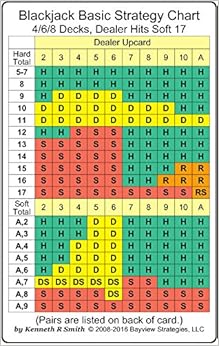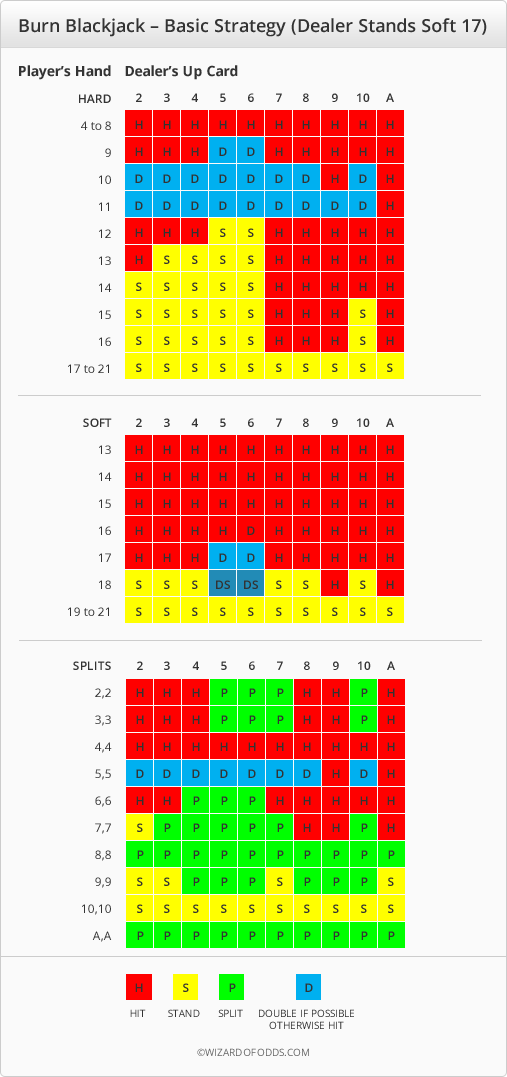Double Deck Blackjack Strategy Dealer Hits Soft 17
- Double Deck Blackjack Strategy Dealer Hits Soft 17 Blackjack
- Double Deck Blackjack Strategy Dealer Hits Soft 17 Against

- Appendices
- Miscellaneous
- External Links
Appendix 3c:Composition dependent exceptions to single deck basic strategy where the dealer hits a soft 17. Appendix 4:Details on the standard deviation in blackjack. Appendix 5:Infinite deck expected return according to player hand and dealer up card. To use the basic strategy, look up your hand along the left vertical edge and the dealer's up card along the top. In both cases an A stands for ace. From top to bottom are the hard totals, soft totals, and splittable hands. There are two charts depending on whether the dealer hits or stands on soft 17. Casinos also often enforce disadvantageous rule variations on single-deck and double-deck games in order to give the house more of an edge. These variations can include requiring the dealer to hit on soft 17, not allowing players to double down after a split, not allowing the resplitting of aces and a number of other variations.
On This Page
Introduction
To use the basic strategy, look up your hand along the left vertical edge and the dealer's up card along the top. In both cases an A stands for ace. From top to bottom are the hard totals, soft totals, and splittable hands. There are two charts depending on whether the dealer hits or stands on soft 17.
Double Deck Blackjack Strategy Dealer Hits Soft 17 Blackjack

Other basic strategy rules.
- Never take insurance or 'even money.'
- If there is no row for splitting (fives and tens), then look up your hand as a hard total (10 or 20).
- If you can't split because of a limit on re-splitting, then look up your hand as a hard total, except aces. In the extremely unlikely event you have a pair of aces you can't re-split and drawing to split aces is allowed, then double against a 5 or 6, otherwise hit.
Ideally, the basic strategy shows the play which, on average, will result in the greatest win or the least loss per initial hand played. The way I usually go about this is to look at the initial 2-card hands only. Generally, this will result in the overall best play. However, soft 18 against a dealer ace when the dealer stands on soft 17 provides the only known exception that I am aware of for any number of decks. As my blackjack appendix 9 shows, a 2-card soft 18 vs A has an expected value of hitting of -0.100359, and of standing -0.100502. So with two cards it is very slightly better to hit. However, not all soft 18's are composed of two cards. The more the cards in the player's hand the more the odds favor standing. Simulations show that if forced to always hit or always stand, it is better to stand. I would like to thank Don Schlesinger for bringing this unusual play to my attention.
Written by:Michael Shackleford
Those of you who are new to the game of blackjack may have noticed that some blackjack games are played with one deck of cards while others are played with 2, 4, 6 or even 8 decks of cards. What’s the difference between single and multiple deck games and what are the advantages or disadvantages?
Single deck blackjack has often been looked at as the holy grail of the game because it offers players the best chance to win profits. In fact, the house edge is just 0.15% when players stick to blackjack games with a single deck.
Long ago, single-deck blackjack was the standard and the only game in town. In recent years, however, casinos have moved towards multiple deck games to make it harder for players to count cards, a strategy which has gained popularity over the past few decades. Not only is it more difficult for players to count cards with multiple decks in use, but using multiple decks also increases the house edge slightly.
Many casinos have reintroduced the single-deck blackjack game, but don’t be fooled into thinking that playing a single-deck game will give you better odds. In fact, you will notice that when playing a single-deck game of blackjack many casinos only offer a 6:5 payout for blackjack, while multi-deck games offer 3:2.
If you placed a $10 bet and got blackjack on a multi-card game with 3:2 payout you’d walk away with $15, whereas you’d only get $12 for a single-deck game with a 6:5 payout. The slight increase in the house edge isn’t worth the decrease in the blackjack payout that the house gives for a single-deck game. Therefore, unless you can find a casino that offers a 3:2 payout for single-deck blackjack it is a wise decision to stick to multiple deck games.
Casinos also often enforce disadvantageous rule variations on single-deck and double-deck games in order to give the house more of an edge. These variations can include requiring the dealer to hit on soft 17, not allowing players to double down after a split, not allowing the resplitting of aces and a number of other variations.
Card counter have tried to employ their strategy even when using multiple decks, even though it involves more calculations and a greater risk of losing the correct count. Casinos have developed an arsenal of tactics to disrupt counters who try to count multiple decks. Many have decided to use continuous shuffle machines which shuffle the cards back into the shoe with every hand.
With this being the case, you’d think that finding a single deck blackjack is the greatest thing ever. However, there are actually some disadvantages to the subject as well, which is covered below along with single deck blackjack advantages.
Advantages
The obvious advantage to playing single deck blackjack is just as we stated before in that you’re getting the absolute lowest house edge. Facing a 0.15% house edge puts you on nearly a level playing field with the casino, and makes your chance of profiting seem like a coin flip. Of course, to take advantage of the low casino edge, make sure that you understand good basic blackjack strategy first – otherwise, it doesn’t really matter how many decks you’re dealing with.
There is another big advantage for card counters. Usually, card counters these days are dealing with six and eight deck shoes, which means they have to wait longer for favorable counts. But with single deck blackjack, card counters don’t have to wait nearly as long to get a favorable count, thus letting them bet big much sooner.
Disadvantages
Based on the aforementioned advantages, you wouldn’t think there’d be much downside to single deck blackjack. But the problem is that casinos often advertise single deck games, yet offer unfavorable rules to increase the house edge. And what’s bad about this is that the house edge can actually end up being higher than with six or eight deck blackjack.
In the worst case scenario, casinos will only make 6:5 blackjack payouts instead of 3:2 payouts. This one rule alone will bring the house edge from 0.15% all the way up to 1.45%. Considering the fact that you can still keep the house edge at around 0.5% with both six and eight deck blackjack, it’s sometimes not even worth the effort to search for single deck games. Casinos might put other unfavorable rules in the single deck games too, so watch out for this.
Single and double deck games are generally dealt with the cards face down. This is another tactic that casinos use to thwart counters. Players who stand before your turn will place their cards face down on the table. Since no one has no idea what they are holding, counters not value those cards in the count.

Another disadvantage to single deck blackjack is that you’re very unlikely to earn many comps with this version of the game. After all, if it’s true single deck blackjack you’re playing, the casino won’t make much money off you in the long-term. That said, they aren’t going to be generous with comps either.
Casinos usually offer a few lower limit single deck games to entice players to visit their casino. It is the old bait and switch technique that often works. They know that if the table is full or the betting limits are severely restricted, players will move to higher earning tables.

Double Deck Blackjack Strategy Dealer Hits Soft 17 Against
Learn about the other tricks by reading “How Casinos Cheat.”